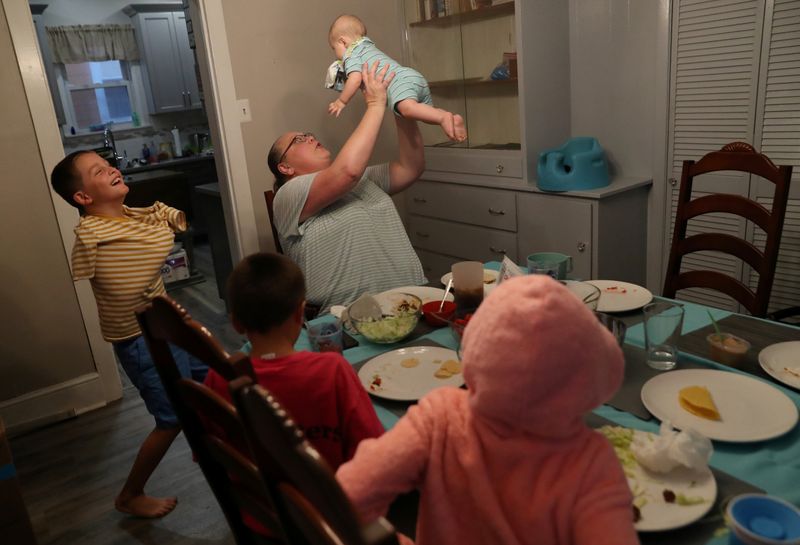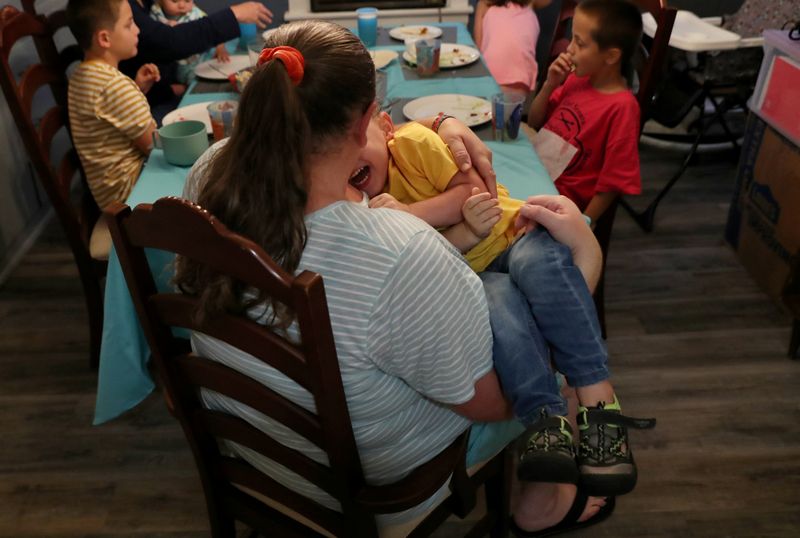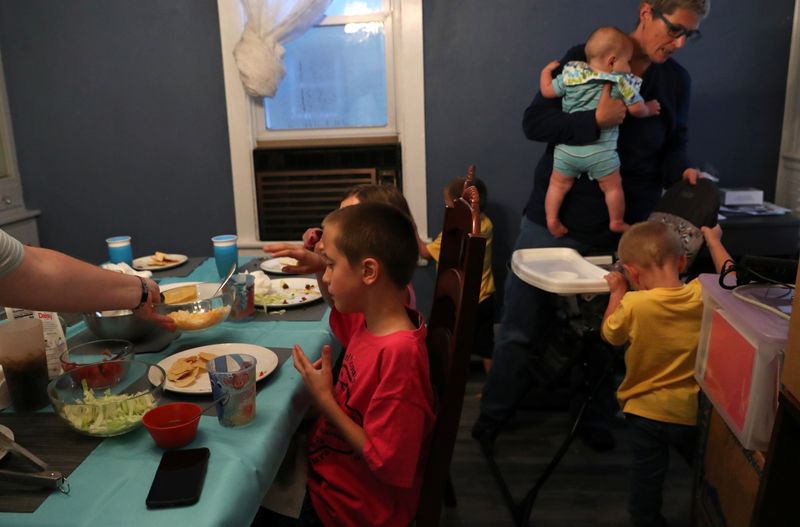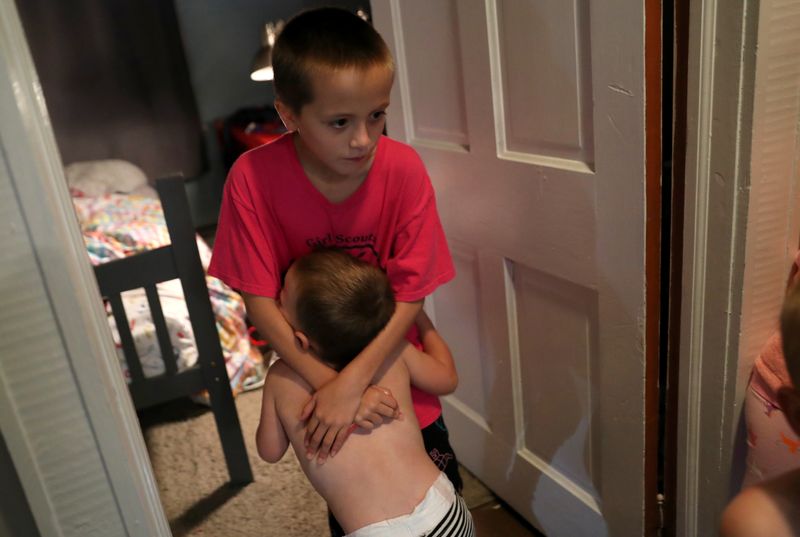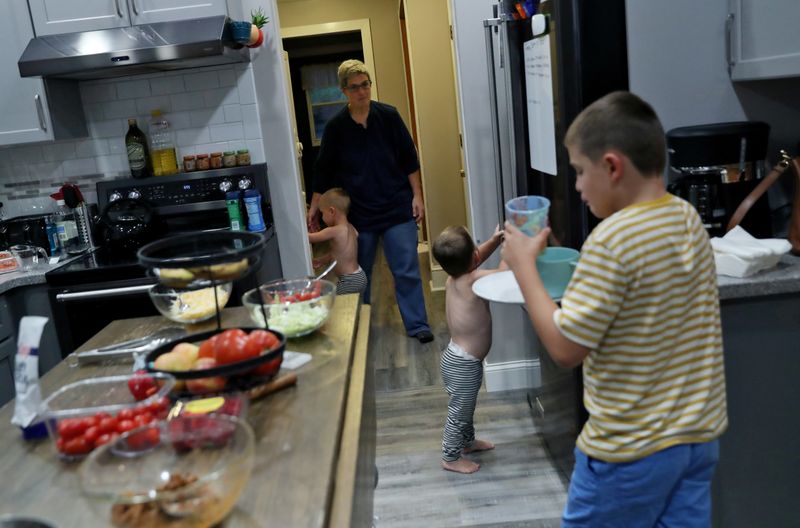(Reuters) -Kelly Newman, a family law attorney, used to leave her New Jersey home at 7 a.m. and return 12 hours later, but since the pandemic made school partly virtual for three of her six kids, she has put her career on hold.
Instead of shuffling between the office and the courtroom, Kelly spends the bulk of her day driving the children, all under 10, to and from school, preparing meals or helping them study from their home in southern New Jersey.
She plans to start her own practice from home, but time is short.
“I spend so much time waiting for kids to do and be done with things,” said Kelly, 46. “Before I know it, every single day it’s bedtime.”
Adding to the stress, the salary her wife, Rachel, 47, earns as a high school teacher is not enough to cover all of their bills. A move over the summer to a bigger rental house ate up much of their savings, and they’re months behind on their electric and internet bills.
Families like the Newmans are lucky in many ways. The immediate family hasn’t lost anyone to the disease, the kids are taking regular classes, and they aren’t going hungry or being evicted.
But even with a vaccine just months away, it may take many Americans years to put their careers and their finances back together, experts say.
As U.S. Congress fight over how to distribute more fiscal aid to businesses, local governments and individual Americans, economic and labor experts have the same urgent plea – err on the side of generosity.
“Overall we just need to give people money so they can keep their budgets whole,” said Kate Bahn, director of labor market policy for the Washington Center for Equitable Growth. That way, the recovery, when it comes, will be easier, she said.
VIRTUAL SCHOOL HITS HARD
Kelly took family leave at the start of the year, before the coronavirus hit, to care for the Newmans’ infant, the youngest of four foster children the couple are in the process of adopting.
She intended to go back to work full-time and rely on childcare to fill in the gaps. But the five other kids are now attending a mix of online and in-person classes, in two different schools with three different schedules.
“I ended up leaving my job just because the logistics of it was not working for my family,” said Kelly, who worked as a lawyer for 13 years.
She applied for unemployment benefits through a program created under the first stimulus package, the CARES Act, aimed at parents who are unable to work because they have no childcare. But that expires at the end of the year.
Families across the United States have made similar readjustments with schools closed again in many states. Some parents are cutting back hours or leaving their jobs altogether. In general, women have felt the impact more than men.
The Newmans’ days start early. Rachel is usually up by around 5 a.m. with the three youngest boys, Kelly at 6 to help the children get dressed before driving them to school.
On the days they aren’t physically in the classroom, the kids set up at the large dining table with their laptops and headphones. Rachel sits at one end, grading assignments and instructing from her computer.
Lessons at home start at about 8:30 a.m. with Rachel on hand to help with technical issues. Between classroom periods she does about three loads of laundry a day.
Meals are a blur of something easy to make in batches, like grilled cheese sandwiches, air fryer chicken nuggets and french fries. After they eat dinner, Rachel puts the youngest boys to sleep while the older children clean up the table.
MAKING IT WORK
Rachel says she loves watching her own children learn, but work is frequently interrupted with questions about snacks or math problems and she misses teaching her students in person.
“I’ll make this work as long as this is what we need to do to keep everyone safe,” she said.
For her part, Kelly is taking on pro bono work, and asking peers for referrals on cases they can’t handle themselves.
Like her, a growing number of Americans have sought new ways of working during the crisis, despite the economic and other hurdles. Some 1.6 million applications for business formation were filed in the third quarter of 2020, up 82% from the same quarter in 2019, according to census data.
Still, Kelly said, “I’m extremely far away from being able to earn revenue or have a client base.”
She calculated it will cost about $2,000 a month, including rent, to cover basic businesses expenses, including malpractice insurance, bookkeeping software, internet and furniture. But after going months with reduced income, she doesn’t have the cash.
“I want to be working,” she said. “I love what I do and I really feel like I’m missing out on a fulfilling part of my life.”
(Reporting by Jonnelle Marte; Editing by Heather Timmons and Sonya Hepinstall)

